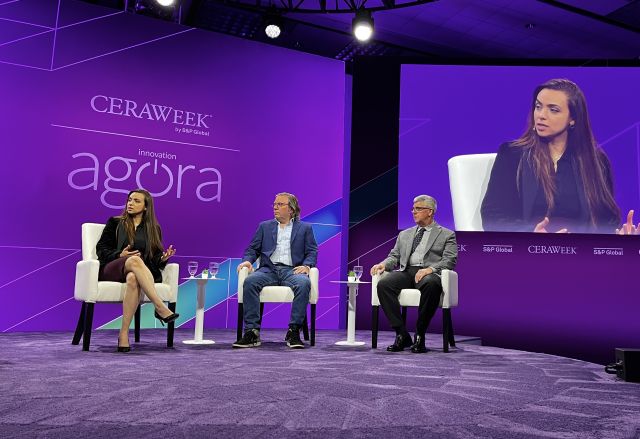
From left, Enass Abo-Hamed of H2GO Power Ltd., Ben Wilson of Amazon Web Services and Jim Chappell of AVEVA during an Agora Studio at CERAWeek by S&P Global. (Source: Jennifer Pallanich/Hart Energy)
AI’s appetite for complexity could solve some of the energy industry’s toughest challenges.
But while AI has come a long way over the years and can help digest complex information, decisions should still be made by humans, experts said during a March 18 session on applications for AI during CERAWeek by S&P Global.
AI and generative AI require a diet of quality data.
“If you look at the data sets that we ingest every single day, it's becoming petabyte scale. We at Amazon, we deal with exabyte scale data now on a very, very regular basis,” said Ben T. Wilson, director of products and solutions at Amazon Web Services (AWS). “And you think about that size of dataset and the information that exists in it and that AI loves complexity, you're going to find these opportunities to be able to identify and act upon that new insight that you couldn't have gotten as a human.”
He also said data governance is critical in the world of AI.
“AI is very much garbage in, garbage out. If you have high quality data, in other words, accurate data, whether it's IoT (Internet of Things) type data or maintenance data, then you're going to get much better results from your AI,” Wilson said.
Enass Abo-Hamed, CEO of H2GO Power Ltd., said one of the significant changes she’s seen in the energy industry is the explosion of data, which fits in nicely with AI’s love of complexity.
“Data is AI's food. AI loves food” as well as complexity, she said.
But software alone doesn’t cut it.
“We really need to make sure that we have hardware to put software on,” she said.
The investment community, she added, is hyper-focused on AI and software and less encouraging about hardware and physical technology.
“That is not going to be sustainable for solving climate change,” she said.
In the field
Jim Chappell, vice president and head of AI at AVEVA Software LLC, said AI has been used in the industrial space for a long time.
“Companies love to brag about how they've used AI for success to avoid problems,” he said.
For one company, AI detected a decrease in vibrations for the current level of operation. The original equipment manufacturer was unconcerned.
“Now they had a choice. Do they believe AI or do they believe the manufacturer? Well, they chose to believe AI,” Chappell said. That decision saved them an estimated $34 million.
After shutting down the turbine, they determined a blade had separated, which caused lower vibration and lowered efficiency, he said.
“It was getting worse and worse,” he said. “Eventually it would've thrown the blade, destroyed the turbine, not only damage to a huge multimillion dollar piece of equipment, but also unplanned outage, massive amounts of unplanned outage, extra labor and so forth.”
Impact of accessibility
Chappell said many people have unwittingly been using AI for years.
“Search engines use AI. You don't realize they use AI in the background. There's been a lot of AI proliferation that people aren't aware of,” he said.
And with the arrival of generative AI trained on large language models, people are able to interact with AI through natural language.
“It is just a more human way of interacting with it,” Chappell said.
Wilson said that AI has finally become accessible to many people. This is critical because even if a company has great technologists and builds a lot of capabilities, if it doesn't get into the hands of people, it can’t be used, he said.
“For me as an individual, someone who builds AI, I've been doing it for the last seven years, that's the most exciting part of this,” Wilson said.
Asking generative AI questions will yield information, he said, but it can also be helpful to ask generative AI what questions you should be asking. Its responses can be insightful.
“This is generative AI, which means it's going to generate new information. That new information is all about what are the opportunities and what are those edges we can't see as humans. And again, I go back to the ‘complex’ point. If you consume so much more complex data, what questions could it ask that you might not be able to formulate?” Wilson said.
But, he cautioned, generative AI is a young technology.
“I don't think I see anything that's mature in generative AI yet. Generative AI is so new, it's been around for 18 months. We can't expect maturity in it,” he said.
It hallucinates—or spews out incorrect information alongside good information, he said.
“We always have to remember decisions should be made by humans, [decisions] should not be made by the AI,” he said.
Some good questions
Abo-Hamed said it makes sense to deploy AI for unsolved problems needing a lot of computing power and a creative solution.
“I would go after problems that normal human capacity cannot solve … easily, or it takes a lot of money, or it takes a lot of time, and attack those with AI,” she said. “I don't think there's a shortage of problems out there where we can respond with efficiency or build a solution in a short amount of time and implement it and test it and scale it. I would do that. I would just choose problems, specific problems that we cannot solve with human force paths and apply it.”
Chappell said he expects to see a shift toward objective-driven questions.
“Instead of saying, ‘What was the highest temperature last month?’ you're going to say, ‘Why is my operation performing worse this month than it did last month?’ Super complicated questions,” he said.
AI would work in the background to break the question down into component parts, such as querying the data historian, maintenance logs and PDF maintenance manuals, as well as look at events that happened, then parse those results to perhaps reveal open work orders that haven't been done.
“That's why there was a problem. It's behind on maintenance. [The answer] could be simple, it could be something more complicated, it could be an engineering design issue. It needs to be able to look at all of this. So give it an objective and let it achieve it and then let it figure out the component parts. I think that mentality is going to be one of the big shifts moving forward,” Chappell said.
Recommended Reading
BP’s Kate Thomson Promoted to CFO, Joins Board
2024-02-05 - Before becoming BP’s interim CFO in September 2023, Kate Thomson served as senior vice president of finance for production and operations.
Why Endeavor Energy's Founder Sold His Company After Years of Rebuffing Offers
2024-02-13 - Autry Stephens', the 85-year-old wildcatter, decision to sell came after he was diagnosed with cancer, according to three people who discussed his health with him.
Kimmeridge Fast Forwards on SilverBow with Takeover Bid
2024-03-13 - Investment firm Kimmeridge Energy Management, which first asked for additional SilverBow Resources board seats, has followed up with a buyout offer. A deal would make a nearly 1 Bcfe/d Eagle Ford pureplay.
M4E Lithium Closes Funding for Brazilian Lithium Exploration
2024-03-15 - M4E’s financing package includes an equity investment, a royalty purchase and an option for a strategic offtake agreement.
Laredo Oil Subsidiary, Erehwon Enter Into Drilling Agreement with Texakoma
2024-03-14 - The agreement with Lustre Oil and Erehwon Oil & Gas would allow Texakoma to participate in the development of 7,375 net acres of mineral rights in Valley County, Montana.





